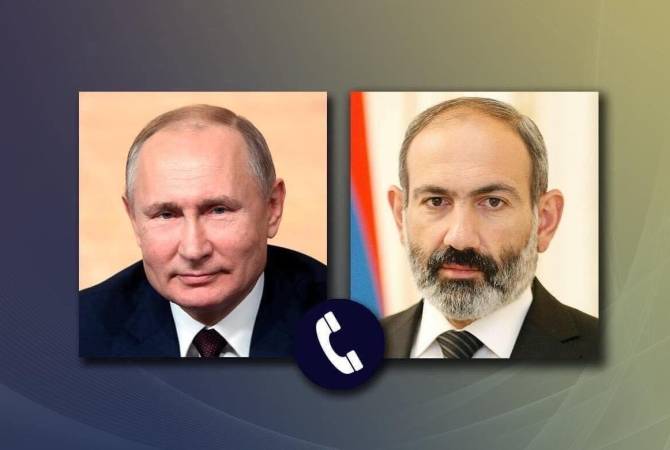The phone call came three days after Azerbaijan installed a checkpoint at the entrance to the Lachin corridor, the only road connecting Armenia with Nagorno-Karabakh, thus tightening an effective blockade around the mostly Armenian-populated region where Russia deployed its peacekeepers after brokering a ceasefire in a 2020 Armenian-Azerbaijani war.
According to an official statement released by the Armenian prime minister’s office, issues “related to the Lachin corridor and the humanitarian situation in Nagorno-Karabakh” were discussed during the phone call.
The Kremlin also reported the phone call, saying that the two leaders discussed “the developments around Nagorno-Karabakh with an emphasis on solving practical tasks to ensure stability and security in the region.”
“In the context of the current tensions in the Lachin corridor, the importance of strict compliance with the entire range of fundamental agreements between the leaders of Russia, Armenia and Azerbaijan was reaffirmed,” the Russian president’s office said, adding that the two leaders agreed that Russian-Armenian contacts would continue “at various levels.”
The phone call between Pashinyan and Putin comes amid reports about the replacement by Moscow of the commander of the Russian peacekeeping force in Nagorno-Karabakh.
According to sources in Stepanakert, Colonel-General Alexander Lentsov, who has served as an advisor to Russian Defense Minister Sergey Shoigu, has already arrived in the region to replace Major-General Andrey Volkov as the commander of the peacekeeping contingent.
Representatives of ethnic Armenian authorities in Nagorno-Karabakh do not conceal in their public remarks that they expect Russia to take more active steps in unblocking the road to relieve the humanitarian situation in the region that has already seen restricted supplies since December when a group of Azerbaijanis calling themselves environmental activists blocked the road at a junction not far from Stepanakert.
According to Stepanakert, Russian peacekeepers managed to bring some humanitarian goods to the region late on Tuesday for the first time in nearly three days of a complete blockade.
Yerevan and Stepanakert insist that the installation by Azerbaijan of a checkpoint on the Lachin corridor contradicts the terms of the Moscow-brokered ceasefire agreement that designates the five-kilometer-wide strip of land connecting Nagorno-Karabakh to Armenia as an area of Russian peacekeepers’ responsibility and control.
Official Moscow has also described “unilateral steps” in the Lachin corridor as “unacceptable.”
The United States and France, which along with Russia have spearheaded decades-long efforts to broker a solution to the protracted conflict over Nagorno-Karabakh, have voiced their concerns about the developments in the Lachin corridor, saying that an Azerbaijani checkpoint there undermines efforts to establish confidence and damages the peace process between Baku and Yerevan.
European Union High Representative for Foreign Affairs and Security Policy Josep Borrell also assessed Azerbaijan’s installation of a checkpoint in the Lachin corridor as an act “contrary to the EU’s call to reduce tensions.”
Incidentally, Prime Minister Pashinyan on Wednesday also held a phone call with President of the European Council Charles Michel.
His office said that “the sides exchanged thoughts on the military-political and humanitarian situation in the region.”
Pashinyan reportedly charged that Azerbaijan’s steps in the Lachin corridor are aimed “at the consistent implementation of its policy of ethnic cleansing in Nagorno-Karabakh and complete eviction of Armenians from Nagorno-Karabakh.”
An official statement by the Armenian premier’s office said that “the sides also exchanged thoughts on the Armenia-Azerbaijan negotiation process” and “highlighted the importance of consistent efforts aimed at ensuring stability and peace in the region.”
Azerbaijan brushes aside accusations from the Armenian side, insisting that when installing the border checkpoint, it acted on its sovereign territory. Baku has also pledged that “necessary conditions” would be created for “a transparent and orderly passage of Armenian residents living in the Karabakh region of Azerbaijan” in both directions.
Source: Azatutyun.am




